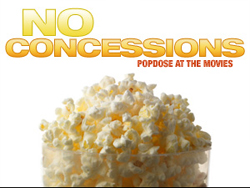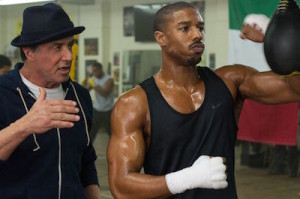 Sylvester Stallone was 30 when Rocky, which he wrote and starred in, took critics and audiences by surprise in 1976. As Rocky’s trainer, Burgess Meredith was 69 when he received an Oscar nomination for the film. Now, at age 69 himself, Stallone steps outside the ring–not for Rocky VII (or would that be Rocky Balboa II?), but for Creed. And the new duties, which find the beloved palooka assisting another fighter and extending a 40-year-old franchise in an unexpected and rewarding new direction, fit him like a fresh pair of boxing gloves.
Sylvester Stallone was 30 when Rocky, which he wrote and starred in, took critics and audiences by surprise in 1976. As Rocky’s trainer, Burgess Meredith was 69 when he received an Oscar nomination for the film. Now, at age 69 himself, Stallone steps outside the ring–not for Rocky VII (or would that be Rocky Balboa II?), but for Creed. And the new duties, which find the beloved palooka assisting another fighter and extending a 40-year-old franchise in an unexpected and rewarding new direction, fit him like a fresh pair of boxing gloves.
Stallone, who graduated to directing the bulk of the sequels, has never been the best manager of the character. Rocky is very much a 70s movie, with a lot of urban bleakness for its heart to break through. Rocky II (1979) simply recycled its predecessor, adding a more triumphant ending, and other than its bad guys I recall very little about the 1982 and 1985 installments, except being irked that Rocky IV cheaply politicized the character into a Cold Warrior. The movies were hits but Rocky had become mechanical, and disposable. When the wall fell no one really cared anymore about Stallone or Rocky, and Rocky V (1990), the character’s first stint as a trainer, flopped.
Stallone, a crude director and not always the most inspired writer, pulled himself together for 2006’s Rocky Balboa, an elegiac production by his standards. And there it stood: the parodic and mildy amusing boxing comedy Grudge Match (2013), not to mention last year’s short-lived Rocky musical, suggested the eye of the tiger would blink no more.
Now comes Creed, directed and co-written (with Aaron Covington) by Ryan Coogler, who debuted with Fruitvale Station (2013). Restricted to acting, Stallone gives his best performance as Rocky since his Oscar-nominated performance in the 70s–but it’s not his movie, and outside of their cold and bleary Baldwin Hills streets the fifth and sixth outings have little presence here. Station star Michael B. Jordan is cast as Adonis Creed, the illegitimate son of Rocky’s best opponent, and later best friend, Apollo Creed. After the boxer’s death, and the subsequent death of his mother, Adonis, who never knew his father, shuttled from foster home to foster home until the fighter’s wife, Mary Anne, took him into Apollo’s LA home. (Phylicia Rashad, radiating the fierce maternal pride that is one of her special gifts, has the role, and gets the film off to a promising start).
 Working a white shoe job, Adonis seems upwardly mobile and content, but something nags at him. Unknown to his adoptive mother and his employer, he’s amassed 15 wins boxing in Tijuana, and is itching to go pro back home. The “why” is the key to the story, and the key to Jordan’s excellent portrayal. There’s none of the bluster and bombast that made Carl Weathers’ Apollo so entertaining–Adonis is an enigma, to himself, and to us. His drives reveal themselves only gradually, when he quits LA, relocates to Philadelphia, and engages the reluctant Rocky, who is himself rooted in a past he can’t quite move on from. (In one of many amusing scenes involving their developing friendship, Adonis says he’s stored a necessary document in “the cloud,” causing Rocky to look skyward, quizzically.)
Working a white shoe job, Adonis seems upwardly mobile and content, but something nags at him. Unknown to his adoptive mother and his employer, he’s amassed 15 wins boxing in Tijuana, and is itching to go pro back home. The “why” is the key to the story, and the key to Jordan’s excellent portrayal. There’s none of the bluster and bombast that made Carl Weathers’ Apollo so entertaining–Adonis is an enigma, to himself, and to us. His drives reveal themselves only gradually, when he quits LA, relocates to Philadelphia, and engages the reluctant Rocky, who is himself rooted in a past he can’t quite move on from. (In one of many amusing scenes involving their developing friendship, Adonis says he’s stored a necessary document in “the cloud,” causing Rocky to look skyward, quizzically.)
Creed is a slow burn of a movie, as the restless Adonis finds a measure of peace, with Rocky and a potential love interest, an intriguing singer named Bianca (Tessa Thompson). But the would-be champ can’t conceal his identity, or his intentions, forever, and the story becomes increasingly turbulent, as Rocky falters and Adonis begins to lose heart on the way to a match with the troubled Ricky Conlan (played, very well, by UK light heavyweight champ Anthony Bellew). In the run up to that, there is a terrifically exciting bout with another fighter, two minutes of which were shot in a single breathless take by the great DP, Maryse Alberti. The highlight of the Conlan matchup is purely, thrillingly emotional, as Jordan’s recessive performance suddenly explodes. This year’s Southpaw was a lump of cliches–Creed draws wisely from an established well.
Ever more corrupt, boxing isn’t much needed anymore, but the metaphor a boxing movie provides regarding common struggles is useful. A quiet rage animates Fruitvale Station. Two years later, in a still-lower ebb for race relations, Creed puts a little love into the world. Bravo.
Rocky was the little movie that could in 1976. In 2015, little movies that can, and do, are three of my favorites of the year, Room, Spotlight, and Brooklyn, the last the best movie to take place about three blocks from my house. (Well, Moonstruck was filmed two blocks from here, but doesn’t take place in the immediate neighborhood.) Go see them. The second wave of end-of-year prestige pictures after the early fall boom comes in soon; I’ll look at those, and see how the others are faring with awards voters, after the break.





Comments